Best Website Building Software 2025: You Should Know These Tools
Want to create a website but don't know how to get started? If you're unfamiliar with CSS and HTML but can't or don't want to hire a professional web designer, it might be time to consider a software solution.
But what programs are out there to help you create a website? And what's the best website-building software? In this guide, we'll let you know.
First, let's clarify what we mean by "programs": When it comes to website building, software-as-a-service (SaaS) has become the standard. Instead of installing it on your computer, you use the programs right in your browser.
While there are still downloadable programs like Adobe Dreamweaver, most website-building software now lives in the cloud. This is especially true for platforms designed for those with no prior web design or programming experience.
In this guide, we'll focus on these types of platforms.
Which Programs Help You Create a Website?
SaaS website-building software can be broken up into two categories:
- 1.
Website builders, which target beginners and trade some advanced options for a more user-friendly experience
- 2.
Content management systems (CMS), which offer more freedom but require deeper technical knowledge
There are other programs and online platforms that can help you design your website. For example, you can use graphic design tools to plan your website's layout or hire freelancers on popular platforms for extra help with copywriting, design, and marketing.
Let's check out the different software categories and some of the most popular providers.
Option 1: Website Builders
Website builders have taken the market by storm because they've made the dream of having a website a reality for those without big budgets or coding skills.
Instead of CSS or HTML, you use visual editors to add and edit pre-made content blocks to your website in a user-friendly way.
With these platforms, you don't need programming or design know-how since the software's presets automatically harmonize your style choices and preferences. The downside is that you work within limits - which vary by provider - and the builder's restrictions might be too tight for you or your project's ambitions.
Not all website builders are the same, with differences in features, design options, and beginner-friendliness. For your convenience, we've grouped them into four categories:
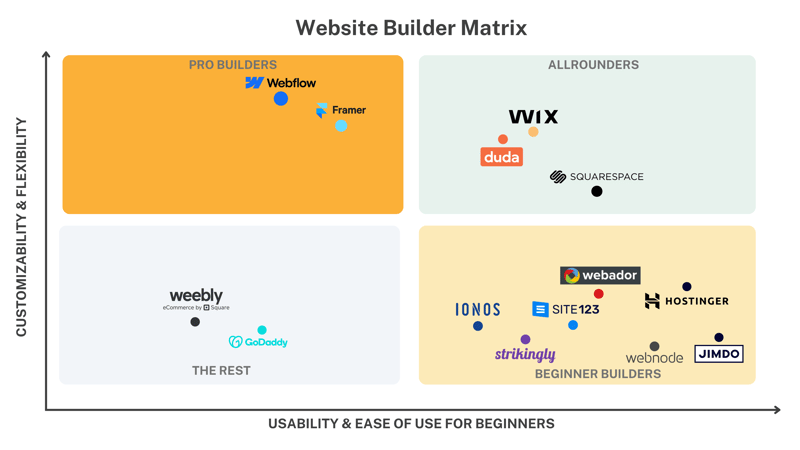
Website builders target different user groups.
Website builders work best for smaller projects with limited budgets and for anyone who wants to create a professional-looking website without coding or design skills and doesn't need fancy features.
Pros and Cons of Website Builders
no programming or design experience needed
high-quality design templates as website foundations
relatively affordable
domain and hosting included
many built-in features, like ecommerce or marketing
limited design freedom
lack of flexibility
websites can look very similar due to templates
potential SEO problems
possible speed and scaling restrictions
If you want to use a website builder, there's no shortage of choices. Depending on what you'd like to design, you can go with a regular website builder or a specialized ecommerce platform. We'll have a quick look at some of both next.
Website Builders
In our EXPERTE.com website builder comparison, we thoroughly reviewed 14 of the most popular platforms according to specific criteria. Here's our top 3:
EXPERTE.com's Winner: Wix

Wix took the top spot in our comparison because the Israeli website builder is easy to use, has a powerful drag-and-drop editor, and comes loaded with a wide range of features.
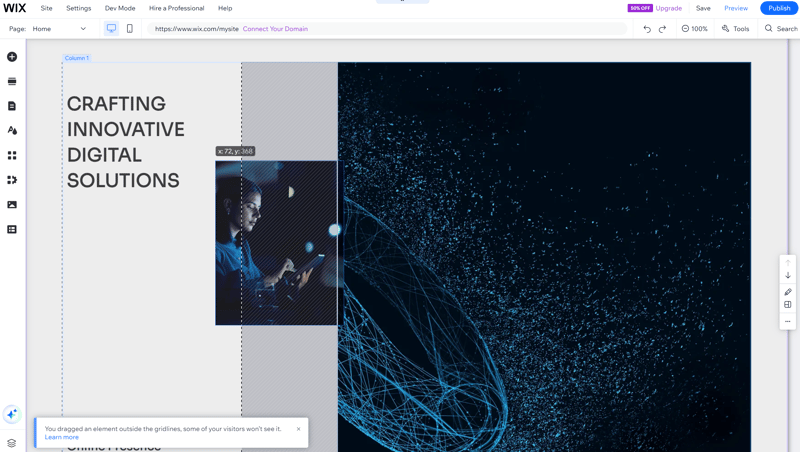
As EXPERTE.com's winner, Wix offers the best overall package.
If you need more than Wix's out-of-the-box features, check out its large app market and its assortment of extensions, some of which are free. Even without add-ons, Wix's selection of features is impressive. And the cherry on top? It works well as an ecommerce platform too.
Elegant Templates: Squarespace

Squarespace is known for its stylish and distinctive templates. Creating a website with it is mostly straightforward, and less experienced users should find the learning curve manageable.

Squarespace's templates are among the most beautiful on the market.
Squarespace isn't short on ecommerce features either. Use them to market your physical products, services, videos on demand, memberships, courses, and more.
Website Builder/CMS Hybrid: Webflow

Webflow is in a league of its own: By combining the ease of use of website builders with the freedom of a CMS, it offers much more flexibility than any other platform from our review. However, it isn't as suitable for beginners as the others since you need some basic understanding of coding principles.
While Webflow's handy editor visualizes programming, it keeps the underlying logic front and center. Some familiarity with the box model will help understand how the platform works.
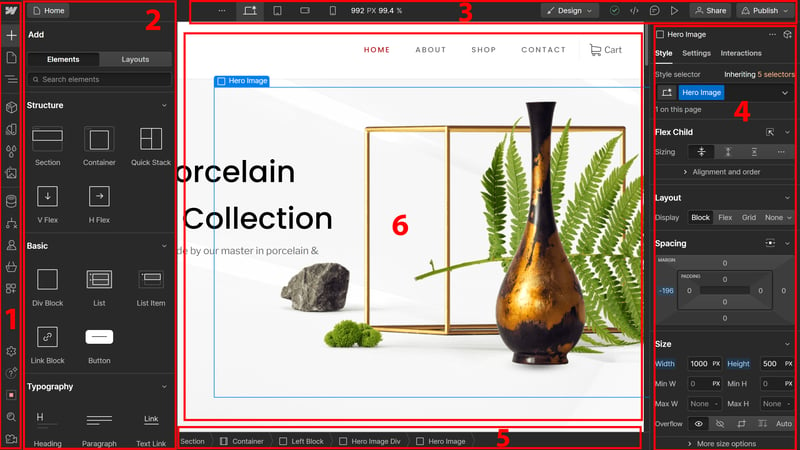
Webflow is much more complex than "regular" website builders.
Webflow lets you do nearly anything that's possible with code, but it's not ideal for the "typical" website builder user who wants to avoid CSS, HTML, and other programming languages.
Ecommerce Systems
Ecommerce systems also take the same approach as website builders to make designing a digital storefront as simple as possible. The only difference is that they focus on ecommerce projects and offer more extensive product management, marketing, and analytics features, as well as payment and shipping options.
We tested 8 ecommerce platforms – here are our favorites:
BigCommerce

BigCommerce is a powerful ecommerce platform that offers great product management, multiple sales channels, and solid analytics features. Use it to create unlimited product variants and boost your store's reach with comprehensive marketing tools.

Flexible product management is essential for ecommerce platforms.
BigCommerce makes it easy to sell in multiple currencies and supports dropshipping and multichannel sales.
Shopify

With Shopify, even less experienced users can easily set up an online store. After that, you can offer different variants of your products and sell them on multiple channels thanks to the platform's multichannel support.
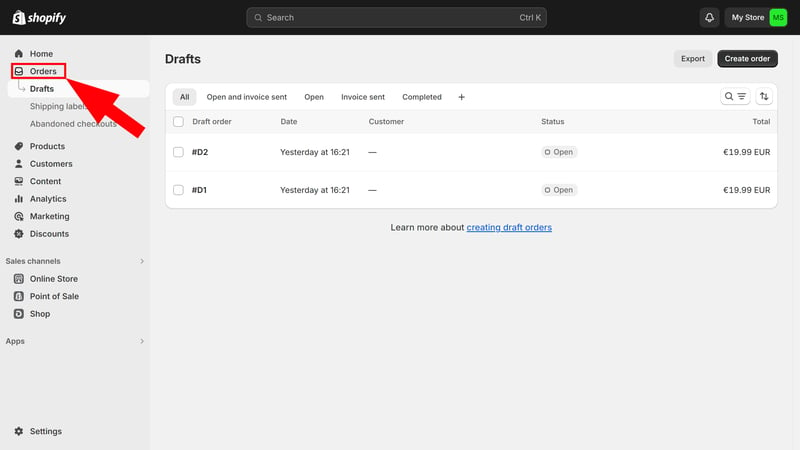
Shopify is one of the most popular ecommerce platforms.
You can also create discounts, promotions, and marketing campaigns with a few clicks and track your sales in detail in Shopify's user-friendly dashboards.
Option 2: Content Management Systems (CMS)
A content management system, or CMS, offers an alternative way to create and manage websites. These platforms are much more flexible than website builders but offer less guidance. If you decide to use a CMS, you'll need to handle many technical and administrative aspects yourself, like hosting and domain management.
The big advantage of using a CMS is that you can customize your website with custom code and countless add-ons. You're not limited to the templates and features the platform offers, like with website builders. Thanks to the variety of extensions, you won't have to make do without drag-and-drop editors either.
Pros and Cons of a CMS
open-source
fewer limitations than website builders
coding experience not required
many plugins available
setup requires more technical knowledge
can't unlock full potential without coding know-how
higher maintenance needs and security risks
hosting and domains not included
CMS Platforms
In our EXPERTE.com CMS comparison, we looked at the most popular CMS platforms. Here are our top 3:
WordPress
WordPress started as a blogging platform. Over time, it gained more features and grew into a full-fledged CMS.
Today, the platform is so popular that many consider it the go-to CMS. Among all the websites that we could identify a CMS for, more than 75% use WordPress.
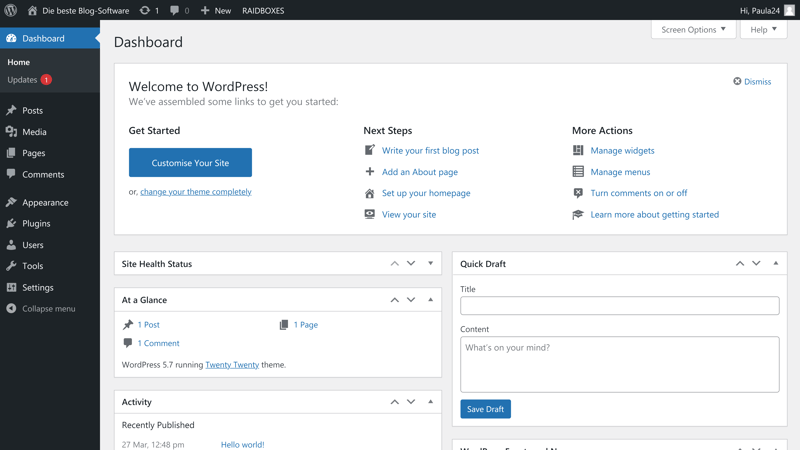
WordPress is by far the most popular CMS on the market.
WordPress is open source and free to use. The platform is versatile and has countless add-ons, making it possible to create just about any online project imaginable.
Drupal
Drupal is also open source and versatile enough to handle all kinds of online projects - from a simple blog to a complex business website.
Setting up Drupal is a bit more complicated than WordPress, and you'll need to make some adjustments after it's installed. There are also fewer add-ons and extensions available. While WordPress works well for both beginners and pros, Drupal is better suited for experienced developers.
Joomla
Joomla is another open-source platform that stands out with its built-in multilingual support. When you use WordPress, you'll need a third-party plugin to achieve the same.
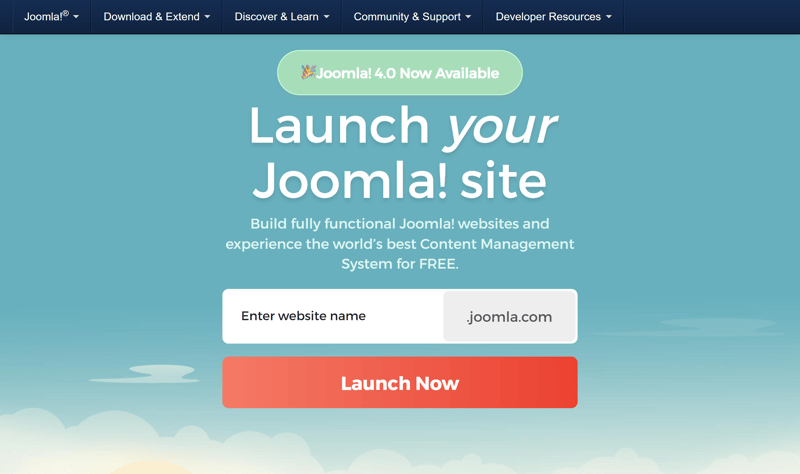
Joomla is a versatile open-source CMS.
Joomla is known for its flexibility in template design, making it a good choice even for those with limited coding experience.
Additional Tools & Software
Building your website is probably the most time-consuming step of launching your digital presence. But the work often starts long before that with planning and strategy, and it doesn't end once the basic structure is in place - after all, a good website is always evolving.
For that reason, it's worth looking at the bigger picture. Here are some helpful programs and platforms that can support you in building and refining your website.
Graphics Software
Website builders are great for putting together your website's pages with the built-in tools and elements they offer. However, they're not always the best choice for the creative process behind it.
That's why it can be helpful to create a draft design using graphics software. Once you have a visual roadmap for your project, you can let it guide your work or share it with a professional web designer to help them better understand your vision.
Here are some graphics programs that focus on web design and website layouts:
Figma
Figma is a design tool for creating user interfaces. Use it to draft a prototype for your website with different pages and components to guide you through the design phase.
While Figma is complex, beginners can come to terms with it. No coding knowledge is necessary, and you can even automatically convert design elements into code.
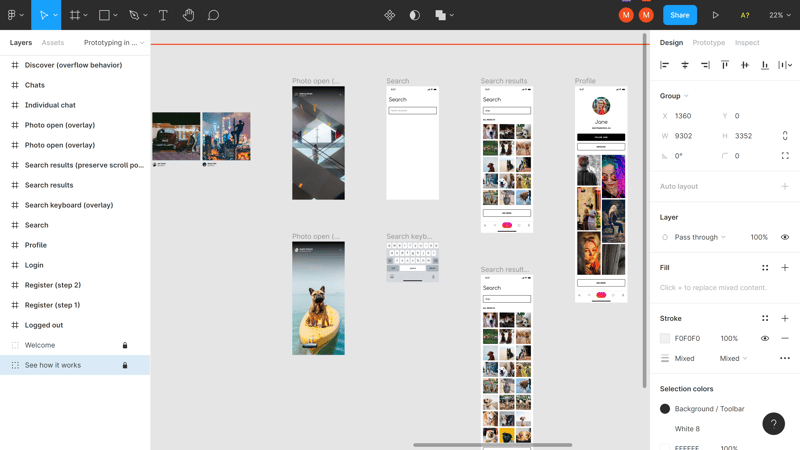
Use Figma to plan your website's design.
You will need a paid subscription to access all of Figma's features. However, there's also a free starter plan that should work well for simple projects.
Want to publish your Figma designs directly as websites? Check out Framer. This platform works like Figma, letting you design freely without the fixed structures and layouts that are typical of website builders.
You can even copy Figma designs directly and keep working on them in Framer.
Sketch
Sketch is one of the most popular design platforms and is intended specifically for creating website prototypes and user interfaces. Unlike Figma, it's not a web app but a downloadable program for macOS (sorry Windows and Linux users).
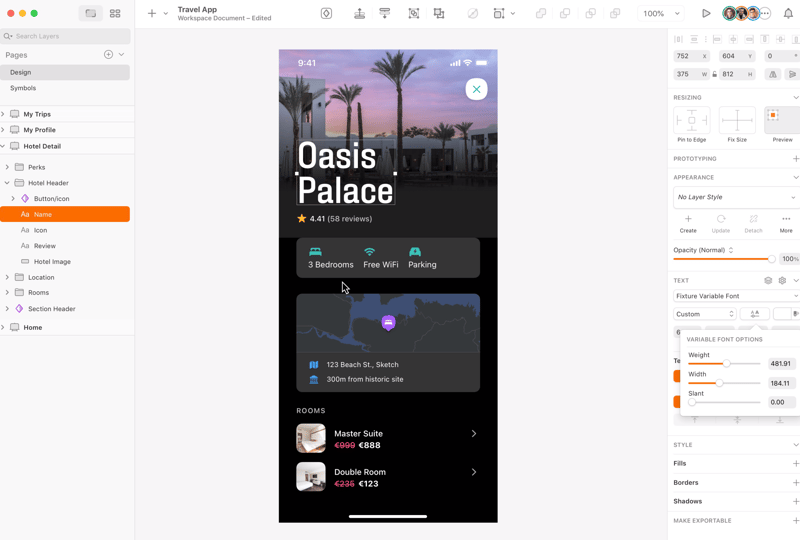
Sketch is a UX design tool for macOS (Image source: Sketch).
This vector-based tool makes interface design easy with a smart grid system and has a cleaner and simpler UI than most design programs. Its built-in collaboration features also simplify working with team members in real time.
Adobe XD
Adobe's popular Creative Cloud suite, which includes programs like Photoshop and InDesign, also features a user interface design tool: Adobe XD.
With its clean, visual interface, Adobe XD is great for creating site layouts and mockups for your web project. Using the right plugins, you can also export Adobe XD designs as HTML or CSS.
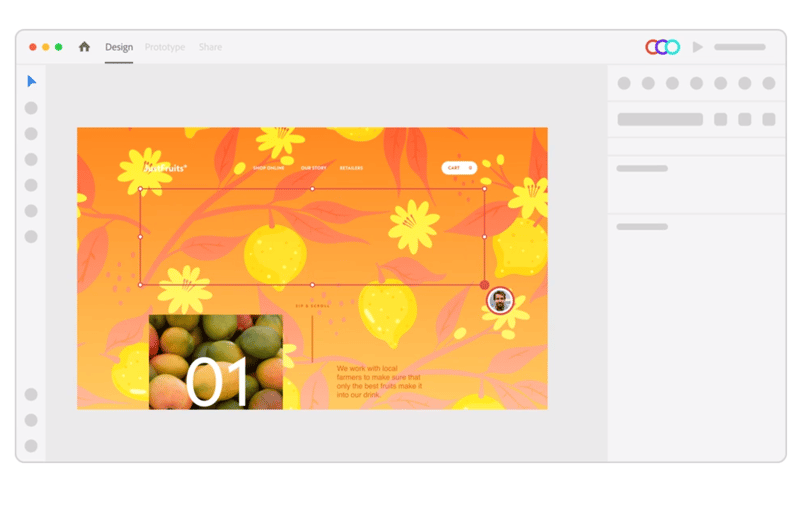
Adobe XD is part of the provider's Creative Cloud.
Being part of Adobe's Creative Cloud is handy because you can easily move assets from Illustrator, Photoshop, and other apps into XD. If you already use Adobe's products, you should feel at home in XD's interface.
Freelance Platforms
While website builders handle the design aspects of a website for you, they're no help with perhaps the most important element of any digital project: your content. After all, content is king and helps sell what you're offering and keeps visitors coming back.
Besides compelling sales copy, you might also want a hand with marketing or more extensive design help than what website builders provide.
There's plenty of professional help available for all these extra tasks that come with running a website. On freelance platforms, experts and specialists of all backgrounds and price ranges offer their services. Here are some of the most popular ones:
Upwork
On Upwork, freelancers create profiles and compete for jobs. As a client, you can post job listings (free) and specify what you're looking for, like a copywriter or a designer. Then, indicate your desired budget and experience level.
After that, you'll get applications from freelancers, and you can pick the best person for your project.
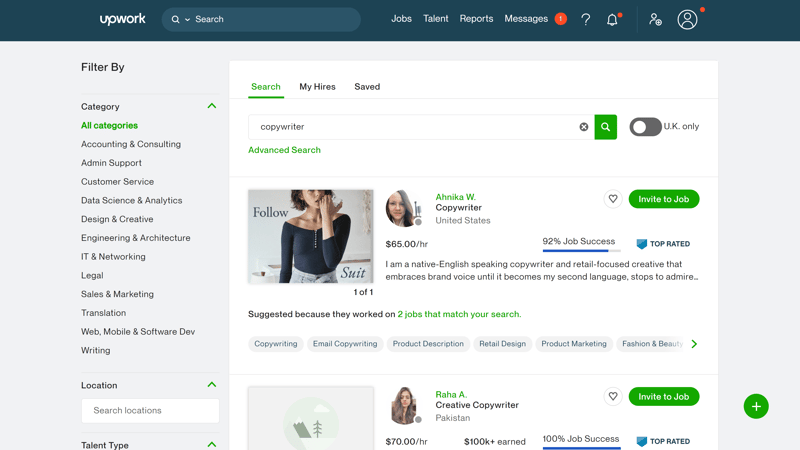
On Upwork, you can find the right freelancer for any project.
You can pay freelancers per project, at specific milestones, or by the hour. The platform has built-in messaging and video meeting features to facilitate secure communications as well.
Fiverr
Fiverr started by offering mini-services for just five dollars - that's where the name comes from, and it stuck. Today, Fiverr is a full-service freelance platform where you can find digital contractors for just about everything, from web design to logo creation and copywriting.
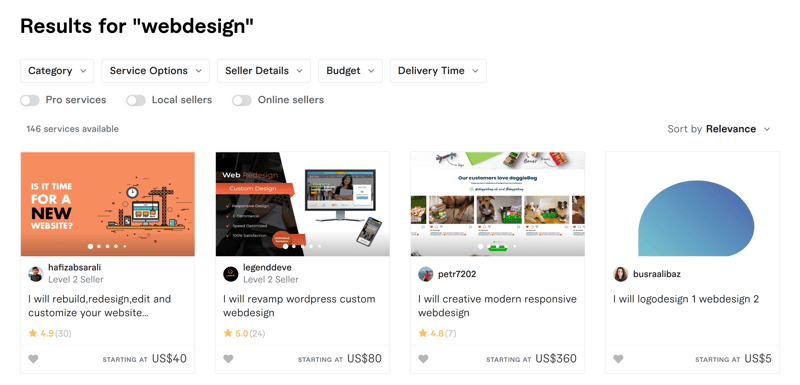
On Fiverr, freelancers offer their services in different pricing packages.
Unlike Upwork, you don't create job posts for Fiverr freelancers to apply to. Instead, type in what you need, like "web design" or "copywriting," and you'll find freelancer profiles that match your project. Services are offered at different rates (Basic, Standard, or Premium packages).
AI Tools
Last but not least are the countless AI tools that can help you create and design websites.
Many website builders have built AI features into their editors, allowing you to create a first draft of your website using prompts. Other website builders claim to fully automate the website design process, but this doesn't work very well yet.
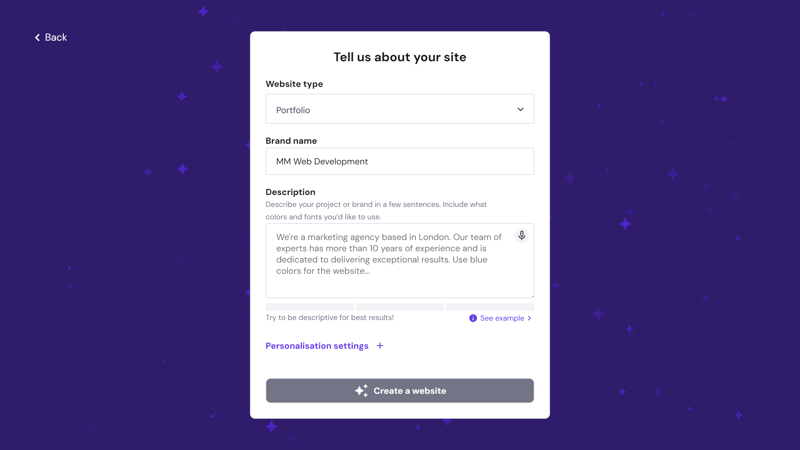
Many website builders (like Hostinger) now have built-in AI assistants.
You can also use AI text and image generators to create content for your website. Here's a selection of the most useful AI platforms:
Conclusion
There are countless tools to help you create a website or open your online store. If you don't want to hire professional designers and programmers, you have two main options: you can use a website builder or a content management system (CMS).
Website builders are perfect for beginners who don't know anything about coding but want to quickly make a professional website and get it online with as little fuss as possible (hosting and domain included). While the easier option of the two, website builders limit your creative freedom and design options.
A CMS is what you make of it: To tap into its full potential, you need programming skills (or the means to hire specialists who have them). You'll then be able to create whatever you can imagine. For experienced users and website projects that are more complex and/or will see strong growth, a CMS is the better choice.
If you need help designing and running your website, you can easily hire professionals and specialists on freelance platforms like Upwork, Fiverr, or Freelancer.com. For creative design work, check out website design tools like Figma, Sketch, or Adobe XD.
Want to know how much a website will cost? We've put together an overview of the costs for each method.

















